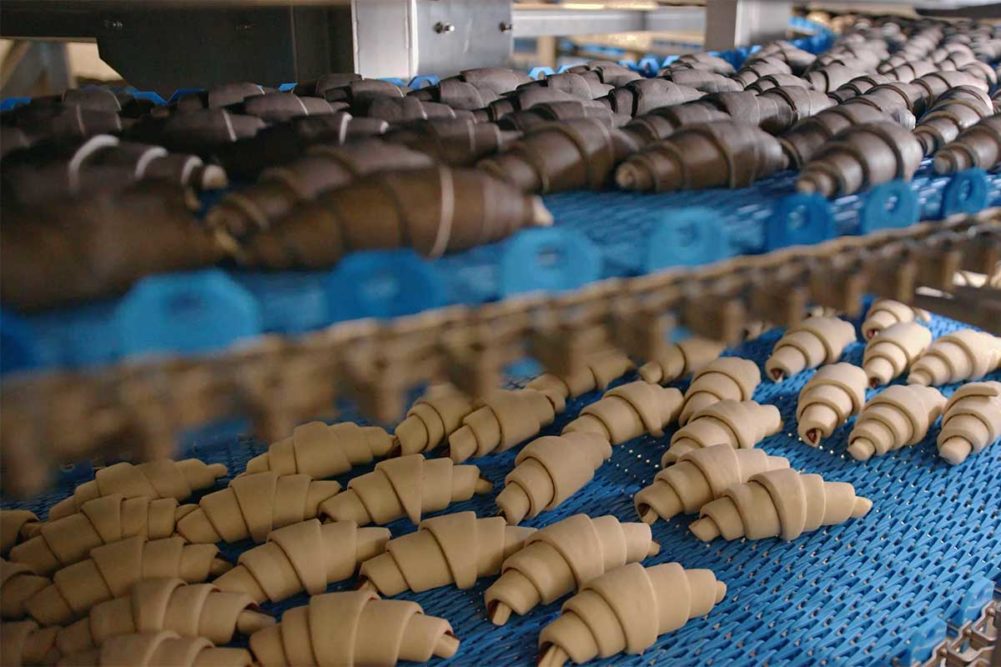It takes many delicate layers of dough and fat for bakers to craft high-quality Danish, puff pastries, croissants and other laminated baked goods. Making these products requires plenty of time and labor when done manually, two ingredients bakers are increasingly short on as they aim to boost throughput amid workforce shortages.
Automation is an obvious solution to these challenges, but making that leap can be daunting for those baking laminated pastries. To many, the high speeds of automation mean a compromise in product quality compared to those made by hand. However, the exact opposite is often true — especially for pastries — noted John Giacoio, vice president of sales, Rheon USA.
“It is thought that a manual process is the pinnacle of quality, but if you consider the differences in product forming and especially how you would reduce the dough sheet thickness, this lends itself to damaging the delicate layers,” he explained. “[Automation] should mean increased quality and efficiency.”
Whether moving to a semi- or fully automated process, pastry manufacturers can solve the biggest challenges their operation faces while maintaining — or even improving — product quality.
Protecting pastry structure
Equipment today significantly reduces the stress it puts on laminated pastries to ensure their fragile structure is maintained. The most critical step in accomplishing this, Giacoio explained, is the reduction of the dough after laminating. The use of a rolling pin or compression roller puts pressure on the dough and crushes its layers, leading to a host of issues for bakers, he warned.
“This is usually compensated for by adding layers that are not needed to achieve the needed volume in the finished product,” he said. “By adding layers, you increase product cost, and the finished product will have excess butter causing a less than quality product.”
Rheon designs its sheeters to use a stretcher that uses three conveyors to pull the dough, protecting its layers and improving product structure.
“For the baker, this means less layers can be used, but the puff is increased,” he said. “With no damage to the layers the fat is trapped, and when baked there’s no place to go but up.”
Fritsch’s laminating lines use SoftProcessing technology, designed so that no mechanical load or heating energy will affect dough temperature.
“Wherever targeted dough temperature control is needed, as in the proofing and cooling processes, our lines use gentle air movements to maintain utmost uniformity of temperature and moisture characteristics,” said Stefan Praller, senior director, customer experience, Fritsch, a Multivac Group company.
The vane cell design and servo-filling and depositing of Handtmann systems similarly reduce friction and help preserve inclusion integrity, said Joe Alameno, forming and depositing manager.
“This ensures consistent product quality with gentle product movement and a product path up to five times shorter than other systems,” he noted.
For larger operations, AMF Bakery Systems offers complete pastry production lines. Its AMF Tromp laminating line provides high-speed, stress-free or extrusion laminating of croissants, pastries, Danish and puff pastry products and can produce up to 30,000 croissants an hour.
Automation can maintain pastry integrity, but it may also result in a high level of product uniformity that bakers looking to preserve that “artisan touch” may not want. To remedy this, bakers may keep “men in the loop” at specific production stages to preserve a unique, hand-made quality in each pastry, suggested Nicola Menardo, president, TP Food Group, North America.
A growing number of pastry manufacturers are also making frozen products, offering an easy-to-prepare solution for labor-strapped foodservice operations. However, the freezing process will damage pastry quality as well if not done properly.
“When freezing the finished product, it is important that this process is fast to preserve the product quality and prevent deformation of the finished product,” Giacoio said.
Spiral freezers are the most economical and effective way to individually quick freeze pastry products, noted John Bauer, PNA freezer product manager, JBT Corp. The company offers a variety of self-stacking spiral freezers for both raw and proofed pastry dough applications.
Menardo added the company’s spiral proofers can integrate a boost cooling section, making them especially effective for laminated products.
“Proofers configured in such a way bring product temperature down evenly and bring several other process benefits which help the dough, preserving texture and density while avoiding negative effects such as shrinkages and deformation,” he explained.
This article is an excerpt from the February 2024 issue of Baking & Snack. To read the entire feature on Sweet Goods Processing, click here.





